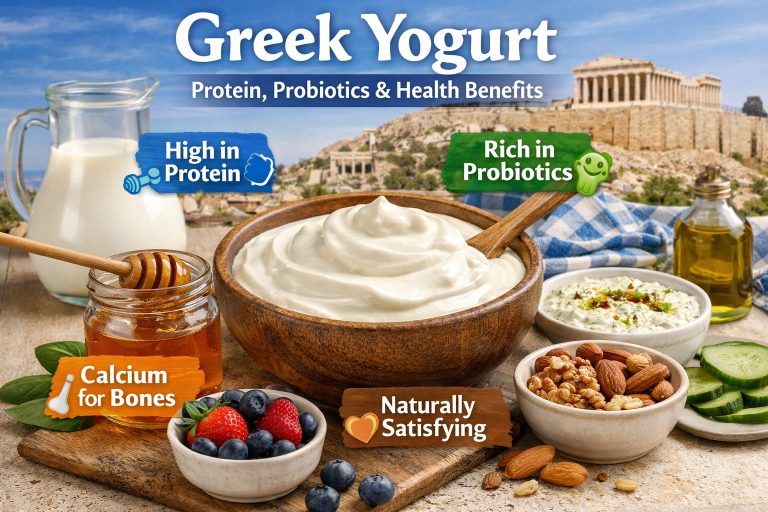
Greek food is known for its tasty flavors, colourful, nice looks, and healthy ingredients. Deeply connected to ancient traditions, it highlights fresh, locally sourced produce that supports both taste and health. Below is a closer look at some of Greece’s most beloved dishes, their nutritional benefits, and the role they play in maintaining a balanced diet.
1. Greek Salad (Horiatiki)
Greek salad, or Horiatiki, is a refreshing mix of ripe tomatoes, crisp cucumbers, red onions, green bell peppers, Kalamata olives, and feta cheese, all drizzled with high-quality olive oil and sprinkled with oregano.

Health Benefits:
- Rich in Vegetables: Provides an abundance of vitamins (A, C, K) and minerals (potassium, magnesium) essential for overall health.
- Heart-Healthy Fats: Olive oil is rich in monounsaturated fats that can reduce the risk of heart disease.
- Low Calorie: A nutrient-dense option that helps in weight management while keeping you satisfied.
2. Moussaka
Description:
Moussaka is a comforting baked dish made with layers of eggplant, minced meat (often lamb or beef), and a creamy béchamel sauce, seasoned with spices like cinnamon and nutmeg.

Health Benefits:
- Nutrient-Dense: Contains protein from meat and fiber from eggplant, making it a balanced meal.
- Rich in Antioxidants: Eggplant is a great source of antioxidants, which help combat oxidative stress in the body.
- Balanced Meal: Provides a good mix of carbohydrates, protein, and healthy fats.
3. Tzatziki
Description:
Tzatziki is a creamy dip made from Greek yogurt, grated cucumber, garlic, lemon juice, and fresh herbs like dill or mint.

Health Benefits:
- Probiotics: Greek yogurt contains beneficial bacteria that support gut health and digestion.
- Hydrating: Cucumbers are high in water content, helping keep you hydrated.
- Low Calorie: A healthy alternative to many creamy dips, making it great for snacking.
4. Dolmades
Description:
Dolmades are grape leaves stuffed with a mixture of rice, herbs, and sometimes minced meat, often served with a squeeze of lemon.

Health Benefits:
- High in Fiber: Promotes healthy digestion and can help lower cholesterol levels.
- Vitamins and Minerals: Grape leaves are rich in vitamins A, C, and K, as well as iron and calcium.
- Low in Calories: A light and nutritious option that’s perfect as a starter or snack.
5. Spanakopita
Description:
Spanakopita is a savory pastry filled with spinach, feta cheese, onions, and herbs, wrapped in crispy phyllo dough.

Health Benefits:
- Rich in Iron: Spinach provides iron and other essential nutrients, supporting energy levels.
- Good Source of Calcium: Feta cheese contributes calcium, which is vital for bone health.
- Antioxidant Properties: Spinach is loaded with antioxidants that help fight inflammation.
6. Lentil Soup (Fakes)
Description:
Fakes is a hearty soup made from lentils, tomatoes, onions, and a blend of spices, often served with crusty bread.

Health Benefits:
- High in Protein: Lentils are an excellent source of plant-based protein, making them great for vegetarians.
- Rich in Fiber: Supports digestive health and helps maintain stable blood sugar levels.
- Low in Fat: A nutritious option that is filling without being high in calories.
7. Baklava
Description:
Baklava is a sweet pastry made with layers of phyllo dough filled with chopped nuts and sweetened with honey or syrup.

Health Benefits:
- Antioxidant-Rich: Nuts provide healthy fats and antioxidants that support heart health.
- Energy Boosting: A good source of carbohydrates for quick energy, making it a delightful treat.
- Moderation is Key: While high in calories, enjoying it in small portions can satisfy your sweet tooth.
Conclusion
Greek cuisine offers a diverse array of dishes that are not only delicious but also packed with health benefits. Incorporating these popular foods into your diet can enhance your overall well-being while allowing you to enjoy the rich flavors of Greece. Whether it’s a fresh Greek salad or a hearty bowl of lentil soup, there’s something for everyone to enjoy



